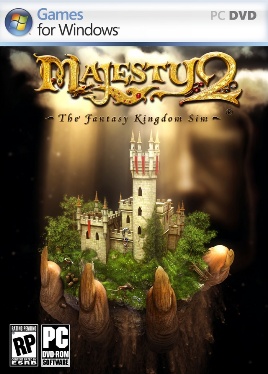
SimCity 2000 is a city-building simulation video game jointly developed by Will Wright and Fred Haslam of Maxis. It is the successor to SimCity Classic and was released for Apple Macintosh and MS-DOS personal computers in 1993, after which it was released on many other platforms over the following years, such as the Sega Saturn and SNES game consoles in 1995 and the PlayStation in 1996.

SimCity 3000 is a city building simulation video game released in 1999, and the third major installment in the SimCity series. It was published by Electronic Arts (EA) and developed by series creator Maxis. It was released for Microsoft Windows, Macintosh, and, through an arrangement with Loki Games, Linux.

Neverwinter Nights is a third-person role-playing video game developed by BioWare. Interplay Entertainment was originally set to publish the game, but financial difficulties led to it being taken over by Infogrames, who released the game under their Atari range of titles. It is the first installment in the Neverwinter Nights series and was released for Microsoft Windows on June 18, 2002. BioWare later released a Linux client in June 2003, requiring a purchased copy of the game to play. MacSoft released a Mac OS X port in August 2003.
Heroes of Might and Magic, known as Might & Magic Heroes since 2011, is a series of video games created and developed by Jon Van Caneghem through New World Computing.

World of Warcraft (WoW) is a massively multiplayer online role-playing game (MMORPG) released in 2004 by Blizzard Entertainment. Set in the Warcraft fantasy universe, World of Warcraft takes place within the world of Azeroth, approximately four years after the events of the previous game in the series, Warcraft III: The Frozen Throne. The game was announced in 2001, and was released for the 10th anniversary of the Warcraft franchise on November 23, 2004. Since launch, World of Warcraft has had nine major expansion packs: The Burning Crusade (2007), Wrath of the Lich King (2008), Cataclysm (2010), Mists of Pandaria (2012), Warlords of Draenor (2014), Legion (2016), Battle for Azeroth (2018), Shadowlands (2020), and Dragonflight (2022). Three further expansions, The War Within, Midnight, and The Last Titan, were announced in 2023.

RollerCoaster Tycoon is a series of construction and management simulation games about building and managing an amusement park. Each game in the series challenges players with open-ended amusement park management and development, and allowing players to construct and customize their own unique roller coasters and other thrill rides.

Heroes of Might and Magic III: The Restoration of Erathia is a turn-based strategy game developed by Jon Van Caneghem through New World Computing originally released for Microsoft Windows by The 3DO Company in 1999. Its ports to several computer and console systems followed in 1999–2000. It is the third installment of the Heroes of Might and Magic series.

Heroes of Might and Magic: A Strategic Quest is a turn-based strategy game developed and published by New World Computing in 1995 for DOS. A spin-off of New World Computing's Might and Magic series of role-playing video games, the success of Heroes of Might and Magic led to a number of sequels.

Disciples II: Dark Prophecy is a 2002 turn-based strategy game by Strategy First for Microsoft Windows. It is the sequel to the 1999 game Disciples: Sacred Lands, and has become significantly more successful in terms of both sales and popularity than its predecessor. A collector's edition version of the game was released, which included a card game based upon the story and five extra quests.

Lords of Magic is a turn-based strategy Microsoft Windows game designed for Windows 95/98 by Sierra On-Line. The game was intended to combine elements of Heroes of Might and Magic II and Lords of the Realm II. The special edition also contains the Legends of Urak quest pack, a set of five individual quests that revolve around stories unrelated to the main plot of the game.

Medieval Conquest is a fantasy-themed real-time strategy personal computer game developed by Cat Daddy Games and published by Global Star Software for Microsoft Windows in 2004. The game involves managing a kingdom by hiring units and building and upgrading structures.

Majesty 2: The Fantasy Kingdom Sim is a real-time strategy game developed by 1C:Ino-Co and published by Paradox Interactive. The game was released on September 18, 2009. It is a sequel to Cyberlore's Majesty: The Fantasy Kingdom Sim.

Age of Empires (AoE) is a real-time strategy video game based on history, developed by Ensemble Studios and published by Microsoft, and the first game in the Age of Empires series. The game uses the Genie Engine, a 2D sprite-based game engine. The game allows the user to act as the leader of an ancient civilization by advancing it through four ages, gaining access to new and improved units with each advance.

King Arthur: The Role-Playing Wargame is a real-time tactics and role-playing video game developed by NeocoreGames and published by Paradox Interactive in North America, Ubisoft in Europe, and E-Frontier in Japan. It seeks to blend elements of the real-time tactics, role-playing, and grand strategy genres into one. A sequel titled King Arthur II: The Role-Playing Wargame was released online in Europe on September 20, 2011, and then worldwide in 2012.

Warcraft II: Tides of Darkness is a fantasy real-time strategy computer game developed by Blizzard Entertainment and released for MS-DOS and Microsoft Windows in 1995 and Mac OS in 1996 by Blizzard's parent, Davidson & Associates. A sequel to Warcraft: Orcs & Humans, the game was met with positive reviews and won most of the major PC gaming awards in 1996. In 1996, Blizzard released an expansion pack, Warcraft II: Beyond the Dark Portal, for DOS and Mac OS, and a compilation, Warcraft II: The Dark Saga, for the PlayStation and Sega Saturn. The Battle.net edition, released in 1999, included Warcraft II: Beyond the Dark Portal, provided Blizzard's online gaming service, and replaced the MS-DOS version with a Windows one.

The Sims Medieval is a life simulation game that was released in March 2011 by Electronic Arts for Microsoft Windows and Mac OS X, and on September 22, 2011 for iOS, as part of The Sims series. It was also made available for Windows Phone on March 26, 2013. Set in medieval times, it allows the player to build a kingdom through quest-driven gameplay. During presentation at E3 2010, a pre-order exclusive Limited Edition was also available.

The Lord of the Rings: The Card Game is a non-collectible customizable card game produced by Fantasy Flight Games. As part of the Living Card Game (LCG) genre, it is a cooperative and strategic card game set in Middle-earth, a fantasy world featured in literary works by J. R. R. Tolkien, including The Hobbit and The Lord of the Rings. Its digital adaptation, titled The Lord of the Rings: Adventure Card Game, is published by Asmodee Digital for cross-platform play on Microsoft Windows, macOS, PlayStation 4, Xbox One and Nintendo Switch, being the "first ever digital LCG".

Armello is a 2015 digital role-playing strategy board game developed by League of Geeks. Announced as an iPad title in September 2012, the game has been in development since mid-2011, with music by composers Lisa Gerrard and Michael Allen. Between April and May 2014, a successful Kickstarter campaign was started to help fund a port to Microsoft Windows as well as stretch goals to bring the game to Android and Windows tablets. The game was chosen to receive additional support from governmental funding agencies Screen Australia and Film Victoria.

Cities: Skylines is a 2015 city-building game developed by Colossal Order and published by Paradox Interactive. The game is a single-player open-ended city-building simulation. Players engage in urban planning by controlling zoning, road placement, taxation, public services, and public transportation of an area. They also work to manage various elements of the city, including its budget, health, employment, traffic, and pollution levels. It is also possible to maintain a city in a sandbox mode, which provides more creative freedom for the player.

Total War: Warhammer is a 2016 turn-based strategy and real-time tactics video game developed by Creative Assembly and published by Sega for Windows via the Steam gaming platform. The game was brought to macOS and Linux by Feral Interactive. The game features the gameplay of the Total War series with factions of Games Workshop's Warhammer Fantasy series; it is the first Total War game not to portray a historical setting. It is the 10th title in the Total War series and the first title to be released in the Total War: Warhammer trilogy.




















